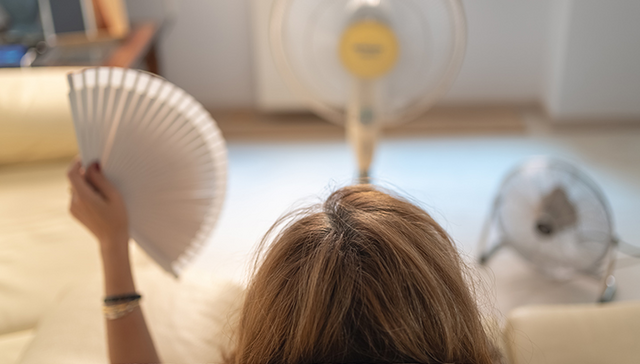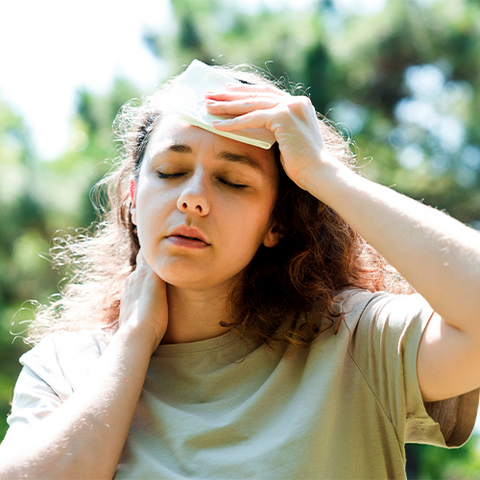Empty cart?
We can only assume that's because you haven't seen our latest offers
Sensilab uses cookies for their websites, which does not store personal data. Some cookies might already be installed. By proceeding to use this website you consent to the cookie usage.
Contact us online
100% satisfaction guarantee
Free delivery above €50
Contact us
info@sensilab.ieHot flashes are sudden waves of heat that sweep through the body and face, often accompanied by sweating and heart palpitations. While some women experience them occasionally without significant discomfort, others experience frequent and intense flashes that can disrupt their sleep, work, and overall well-being.

The science behind hot flashes
Hot flashes are mainly caused by hormonal fluctuations, particularly reduced oestrogen levels, which disrupt the body’s temperature control. They can begin during perimenopause – the phase leading up to menopause when you’re still having periods – and may persist for years afterwards.
Generally, hot flashes are harmless. However, if they’re accompanied by symptoms like weight loss, diarrhoea, or muscle weakness, it’s crucial to consult a GP to rule out other causes.
Managing hot flashes depends entirely on the severity of their impact on your daily life. While some women may find them relatively mild and require no treatment, others may find them more disruptive. Fortunately, there are a few things you can do to mitigate them.
Lifestyle changes
Tweaking certain lifestyle habits can significantly alleviate hot flashes. While it may seem challenging to balance a healthy lifestyle with the hustle and bustle of modern life, making even small changes can yield substantial benefits. Simple changes to your lifestyle, such as practising yoga breathing techniques or other relaxation exercises, can make a noticeable difference.
Cut down on alcohol
Alcohol can affect how your body regulates temperature. When the liver breaks down alcohol, it generates heat, making hot flashes worse. Additionally, alcohol dilates blood vessels, leading to facial blushing and even sweating as your body tries to rid itself of toxins.
Break your caffeine habit
Caffeine is a stimulant that can make you feel jittery and may trigger hot flashes and heart palpitations.
Stop smoking
The nicotine in cigarettes causes your body to release chemicals that raise your heart rate and body temperature, causing hot flashes.
Learn to manage stress and anxiety
Stress and anxiety can activate your nervous system’s “fight or flight” response, resulting in hot flashes and sweating. Cognitive behavioural therapy has been shown to be an effective approach to managing menopausal symptoms, including hot flashes.
Talk to your GP
Discuss any medications you’re taking or medical conditions you have with your GP, as some can make symptoms of hot flashes worse. Your GP can provide you with advice on managing these effects.
Stay cool
Modifying your environment can help manage the discomfort of hot flashes. Opt for lighter, layered clothing that can be easily removed. Switch to more lightweight bedding materials and a cooling pillow to prevent overheating and keep your living space cool by adjusting the thermostat or using a fan when necessary.

A highly effective option for treating hot flashes in menopause is hormone replacement therapy (HRT), available through your GP. Hot flashes are primarily triggered by a decline in hormone levels, particularly oestrogen, and HRT seeks to replenish these hormones. In addition, HRT also offers additional health benefits, such as reducing the risk of osteoporosis and cardiovascular disease, especially when started within ten years of menopause onset.
HRT is not a one-size-fits-all solution, and it’s important to note that it’s just one of several treatment options available. For those who may not be suitable candidates for HRT, there are alternative medications that have been effective in managing symptoms such as hot flashes. However, these medications require careful consideration and discussion with a GP due to potential side effects.
Clonidine
This medication, while primarily used to manage high blood pressure, is the only non-hormonal treatment licensed in the UK for hot flashes. It’s an excellent alternative when HRT is considered unsafe. However, it may not be appropriate for individuals on certain medications or those with low blood pressure. At higher doses, Clonidine can disrupt sleep, which is a factor your GP will have to consider before prescribing.
Gabapentin
Usually used to control epilepsy or chronic nerve pain, Gabapentin is also known to alleviate hot flashes. Unfortunately, higher doses can lead to side effects such as drowsiness, dry mouth, and weight gain.
Antidepressants
Certain antidepressants, specifically selective serotonin reuptake inhibitors (SSRIs) and selective noradrenaline reuptake inhibitors (SNRIs), may be prescribed as an alternative for treating hot flashes when the use of HRT is not safe. It’s crucial to consult with your GP about this option, as these medications are not licensed to treat hot flashes and can also produce side effects at high doses, some of which mimic menopausal symptoms, including reduced libido, nausea, and dry mouth.
In addition to these strategies, consider trying M-Pause, a 100% natural, hormone-free supplement developed by Sensilab. M-Pause has been designed to support women experiencing menopausal and perimenopausal symptoms and offers a natural approach to reducing hot flashes and maintaining a sense of calm and comfort.
Hot flashes are a shared experience among many women during menopause. While lifestyle changes can provide relief, it’s important to have an open dialogue with your GP about the full range of treatment options available, including HRT and the use of natural supplements like M-Pause, to find the most suitable approach for your needs. Remember, reaching out for help is one of the most important things you can do.
Leaving already?
You’ve left [X] items in your cart.
We can’t guarantee the products will still be available when you return.
Check out now and get an EXTRA 10% OFF.
